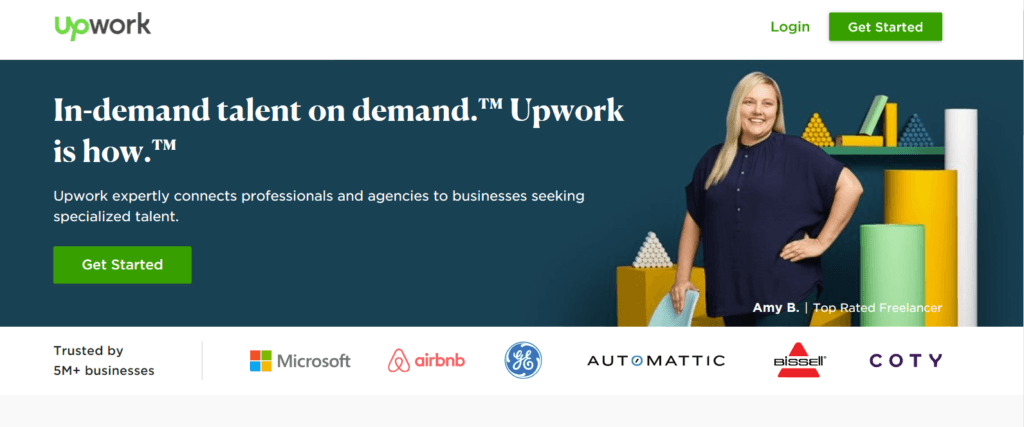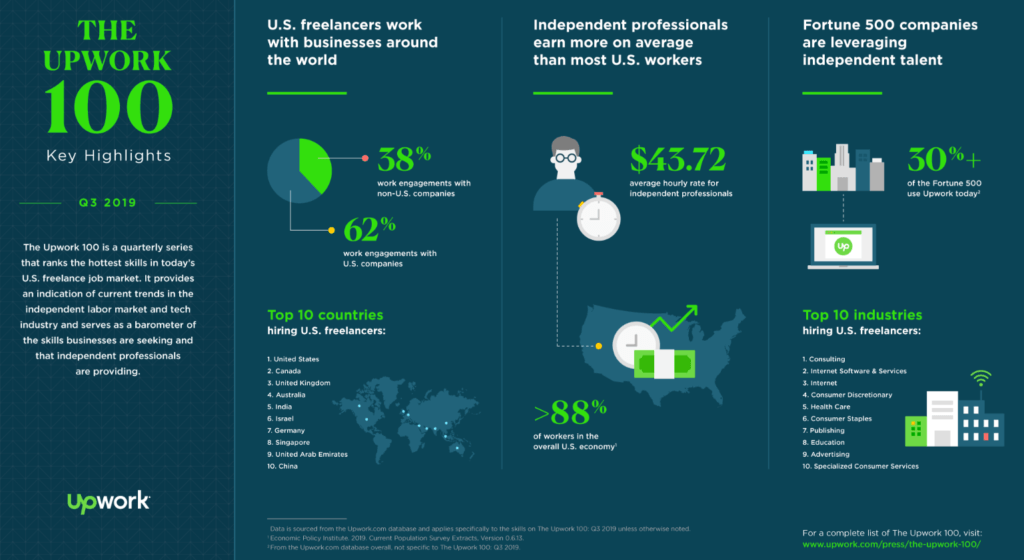Upwork— the future of remote work online

Upwork— the future of remote work online
Upwork founded in 2014 is an online marketplace that connects clients, namely businesses and professionals, to skilled freelancers. The platform currently has 5 million businesses and over 10 million freelancers on the platform. A concept is not new to the industry but with the increasing reliance on online remote work, Upwork becomes an interesting player with potential to make a mark on the platform landscape, especially, during the crisis of the COVID 19 epidemic where working remotely online becomes mandatory and due to the economic fall -out, many are losing jobs. Consequently, technology supporting work from home is on the rise, in addition to Upwork we are seeing a positive trajectory with video conferencing businesses like Zoom as well. As an industry, the online platform shows promising growth that could expand rapidly with strong leadership and good execution.
How does Upwork create value?
Upwork creates value for both the freelancers on the platform and also the clients who are interested in the freelancing services. The prominent categories include web, mobile and software development, IT, design, writing and translation, engineering and architecture, admin support, sales and marketing, customer service, legal, accounting and consulting.
For freelancers, the value that Upwork provides is the convenience and flexibility, the ability to set his or her own price and to choose the work that aligns his or her interest and skills. For clients, Upwork fulfills companies’ need to outsource work cost effectively. Upwork can tap skills and talent globally, whereby, clients have access to the diverse cadre of workforce with the selection advantage for high quality persons at competitive price. Moreover, in working with Upwork, clients can eliminate the administration and cost of recruitment, thus saving time and money.
Where does Upwork capture value?
Upwork is considered to be an intermediary and data aggregator. Its platform main roles are to mediate and organize a fragmented market of clients and freelancers by acting as a transparent marketplace, decentralizing decision making, and navigating the optimal market price based on needs of clients and service delivery of the freelancers.
How is Upwork doing in regards to scaling and sustaining its growth?
Platforms like Upwork leverages a cross-side negative network effect. The more freelancers there are on the platform, the more clients the platforms will attract and vice versa. Keep in mind, such service not just the quantity of service is important but quality of service is crucial. Therefore, the role of Upwork becomes more than a facilitator of the service but also quality controller as trust and credibility are critical to its growth. Upwork ensures the quality of the freelancers by implementing a rating system and also displaying the numbers of job completed on the platform by each individual freelancer.
For the same-side network effects, Upwork poses challenges for the freelancers since having more freelancers on the platform makes the ability to get a job more competitive. Similarly, the clients may have to compete for freelancers with high quality talents or ones with very specialized skills.
Therefore, it seems that Upwork benefits the cross-side networks effect more than the same side network effects. However, Upwork may consider strengthening the same side network effect by combining groups of freelancing into digital teams and become more high value services.
This means, in order for Upwork to ensure that both freelancers and clients benefit from its platform, it’s important for the platform to achieve the scale that enable to match freelancers and client effectively and efficiently.
Like any platform, Upwork faces risk of disintermediation. Disintermediation occurs when freelancers and clients eventually bypass Upwork and match themselves off platforms. This happens when freelancers and clients established a long-lasting relationship and both have developed trust to go off platform.
How Upwork does well in the area of disintermediation is by making sure all communication and transaction are done on the platform. The Upwork freelancers also have an incentive to continue on the platform to build their identity and credibility by striving to improve their ratings and accrue completed assignments, in order to have the competitive advantage over others on the platform
The most important thing to lower the risk of disintermediation involves providing adjacent services that will help keep both the clients and freelancers on the platform. For example, customer service help desk, insurance for customer satisfaction, loyalty programs, and consumer data may be employed to enhance the services that freelancers can offer. Creating a supportive community and a sense of belonging for both freelancers and clients can help augment the experience that is more than a merely transactional experience.
Challenges to sustaining Upwork’s scale
Upwork is in a challenging position to sustain its market power. Currently, Upwork collects 5 to 20% of the billing amount for each client which may not be sustainable in order to remain competitive in the playing field. In lieu of policy to curb the COVID 19 epidemics, work from home, as well as more people seeking supplementary income through online remote work online are becoming the norm, therefore, charging a percentage of work done, can work against the attractiveness to the platform as there are now new entrants coming into the market with better pricing. With the rise of the gig economy, already occupying 40% of America’s job and online remote work, multi homing will inevitably occur.
Upwork being one of the largest and one of the earliest players in the market still yield promising trajectory. With the immense amount of data and experienced in the market, understanding of users, greater innovation leverage AI to generate matches, recommendations, and user-experience improvements can leverage Upwork both in terms of scaling and sustaining users on its platform. Upwork can also strengthen its network effects through referral bonus and discounts for clients that are attracting new people into the Upwork community. Creating point of differentiation from its competitors will be key to sustain its scale and market dominance.
Reference:
Photo credits and organizational data: https://www.upwork.com/
https://www.fool.com/investing/2020/03/19/why-upwork-is-rising-today.aspx?source=iedfolrf0000001
Zhu, Feng, Rory McDonald, Marco Iansiti, and Aaron Smith. “Upwork: Reimagining the Future of Work.” Harvard Business School Case 616-027, November 2015. (Revised January 2017.)






I agree completely that the COVID epidemic is going to have a significant impact on professional services going forward. Companies are being mass-exposed to remote working right now, and I think this will help them realize the opportunities it provides and cost saving potential that comes from not having people in the office. I think the area facing most disruption from platforms like Upwork is concrete, short-term technical or design work, while things like strategy projects and legal advice will likely remain either in-house or with established players given the sensitivity, importance, and complexity of the work
Great article – and good point mentioning the impact COVID-19 will have. I wonder too if it will make both employers and employees reevaluate the benefits of a marketplace like Upwork. I also think they’re in a tough spot in regards to market entrants and disintermediation. You mentioned Upwork offering credibility and this “personal brand” to freelancers to incentivize them using the service. But freelancers benefit from working with the same clients and building long term relationships with them. It gives the client piece of mind to work with “someone they know” and allows the freelancer to benefit from a steady stream of income. And as more freelancers join the site, the competition could easily push these freelancers off. I also expect COVID-19 will spur a wave of Upwork-like sites. It’ll be interesting to see how our gig economy develops post this pandemic.
Thank you for this great article.
I completely agree that disintermediation is one of the biggest problem Upwork is facing. As you mentioned, they have already changed their pricing strcuture to try to reduce disintermediation (higher fees for the first transaction -20%- and then lower for other transactions – 5%). I believe this is helpful but is not enough.
I agree that they should focus more on providing value-added services and increase the stickiness of the platform. They already started doing this – a cool example i saw was allowing clients to monitor the work of freelancers in real-time through screenshots (although it got some negative reactions). Maybe they could take a page from the book of ZBJ and partner with co-working spaces like WeWork to provide space for freelancers on its platform for a subsidized fee.